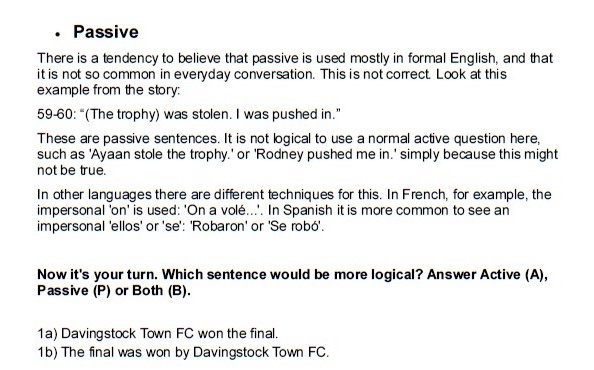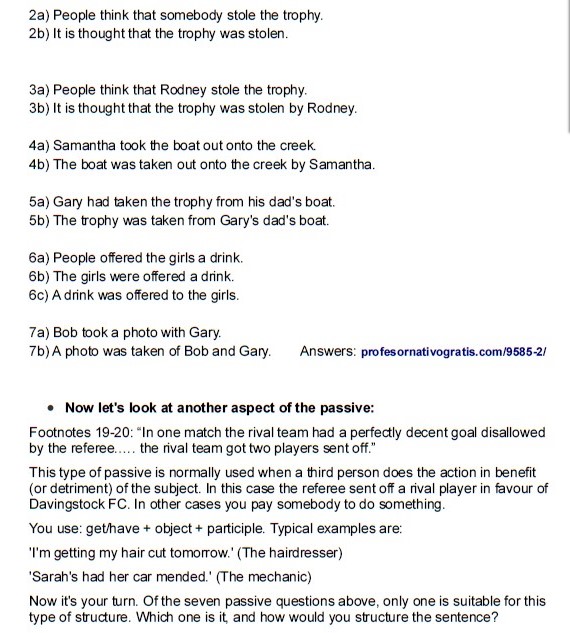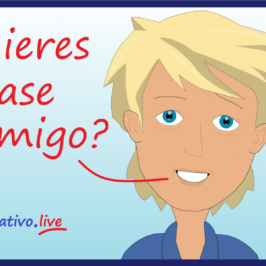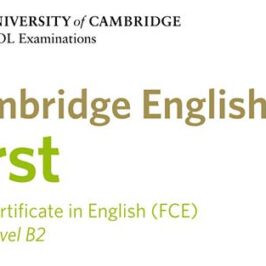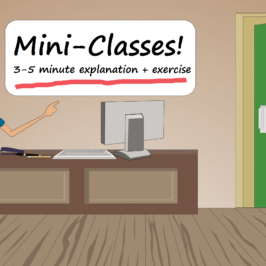Vamos a empezar con un buen ejemplo para entender para que se usa la pasiva. Imagínate que tienes que hacer un proyecto de Historia, y buscas en el Internet sobre la vida de Christopher Columbus (Cristobal Colon). Lees esta frase:
- “Christopher Columbus discovered America in 1492” (ACTIVE)
Luego te pones a leer un artículo sobre las Americas. Ves la misma frase, pero enfocado desde un angulo diferente:
- “America was discovered by Christopher Columbus in 1492” (PASSIVE)
¿Porque esta diferencia? Porque en la segunda frase se habla de America, no de Cristobal Colon. Por eso se cambia ell sujeto de la frase. Si veo a tu hermana sangrando de un dedo, te preguntará ‘¿Que le pasa a tu hermana? Me podrás contestar de dos maneras:
- “A dog bit her” (ACTIVE)
- “She was bitten by a dog” (PASSIVE)
Cual sería mas correcto? Valdrían los dos, pero como te he preguntado por tu hermana (no el perro), lo más logico sería que me contestes usandole a ella como sujeto – o sea, la segunda frase.
¿Como se forma?
1. Sujeto:
John ; The Final ; We ; The whole family ; This book ; I ; England ; My leg etc….
2. ‘BE’ en cualquier forma – presente, pasado, simple, continuo…:
IS ; ARE ; WERE ; IS BEING ; WILL BE ; MUST BE ; HAS BEEN ; ARE GOING TO BE ; WOULD BE ; COULD HAVE BEEN, etc…
3.El Pasado Participio (la 3ª columna) de cualquier otro verbo:
TAKEN ; WRITTEN ; PLAYED ; DRIVEN ; BOUGHT ; WON ; BUILT ; COOKED, etc…..
Ejemplos
- This book WAS WRITTEN by a German soldier during the Second World War. (fue escrito)
- The Final IS GOING TO BE PLAYED this weekend. (va a ser jugado = se va a jugar)
- You HAVE BEEN WARNED! (has sido avisado = te han avisado)
- A new bridge IS BEING BUILT. (esta siendo construido = se esta construyendo)
Hay frases con dos sujetos. Es mejor usar como sujeto la persona más que una cosa:
- “We WILL BE GIVEN the marks tomorrow” (seremos dados = nos darán)
- “The marks WILL BE GIVEN to us tomorrow”. (las notas serán dados = nos darán)
Valen los dos, pero como regla general es mejor usar como plantilla la primera.
¿Cuando se usa la Pasiva?
Este es lo que causa los problemas a la mayoría. Cuando traduces una pasiva, muchas veces suena muy extraña, y parece que no tiene sentido. Hay 3 maneras donde puedes identificar cuando debes usarla:
[widgets_on_pages id=”Advert”]1. Lo mismo que en Español
‘Hamlet’ WAS WRITTEN by Shakespeare, and ‘Don Quijote’ fue escrito por Cervantes.
Pero en Español esta estructura se suele usar sólo en el pasado. No se suele oir ‘Los robots serán mandados al espacio’ por ejemplo. Así que tenemos que seguir:
2. In Spanish: ‘SE …’
No siempre, pero como regla general la pasiva se usa (“is used”) cuando en Español oyes una frase con “Se …”
- ¿Se vendió la casa? = Was the house sold?
- Se piensa que….. = It is thought that….
- Se sabrá pronto = It will be known soon.
Pero ten cuidado. Si se usa en una frase reflexiva, no es lo mismo:
¡Cuanto se lava (Juan)! (Reflexiva, not pasiva) = He washes himself so much!
¡Cuanto se lava (el coche)! (Pasiva) = It’s washed so often!
Se cortó el dedo (Reflexiva) = He cut his finger.
Se lesionó en un partido de baloncesto (Pasiva) = He was injured
Recuerda que para ser pasiva una cosa/persona tiene que hacer algo a otra cosa/persona. Se se hace a sí mismo, es reflexiva, no pasiva.
3. Impersonal “Ellos”
¿Como traducirías esta frase?
“Me han dicho que ….” (In French: On me dit que…)
Si dices en Inglés “They have told me that…” un nativo directamente te va a preguntar “¿Quien?” porque creerá que ha perdido parte de la conversación. Has dicho ‘They’ y no sabe a quien te refieres. Así que debes usar la pasiva:
“I have been told that….” (Yo he sido dicho que…)
Suena muy raro, ya lo sé, pero cuanto más lo usas, más noormal te parece:
- “Aqui (se) cultivan peras” = Las peras son cultivadas = “Pears are grown here”
- “Le van a decir mañana” = Va a ser dicho mañana = “He’s going to be told tomorrow”
- “Le estan llevando al hospital” = Esta siendo llevada = “She‘s being taken to hospital”
Es verdad que, por ser impersonal, la pasiva se usa mucho en manuales técnicos o discurso formal, pero es un error creer que sólo es eso. Es muy comun en la conversación del día a día. Sólo tienes que recordar estas 3 situaciones y aplicarlas.
Una cosa más:
- This present was bought by my Uncle for my Aunt.
by = por / for = para
Exams
Debo decir que nunca me han gustado las típicas preguntas de examen cuando tienes que convertir frases en activa a la pasiva y al revés. No es práctico ni útil. Cuando hablas, tu mente no hace (no necesita hacer) ese ejercicio para usar la pasiva. No tiene sentido, PERO…..es lo que hay, y tienes que aprobar. Así que, vamo a ayudarte aprobar esos examenes. Puedes aprender el Inglés otro día. 😉
EXAM QUESTION. Look at these Active Sentences. You have to change them into Passive:
- The police have arrested a thief in the city centre.
- Jane’s parents will drive her to school.
- People are using computers and mobiles for everything.
- The electorate would have voted the other candidate.
- Scientists are going to study that phenomenon.
1. CAMBIA EL SUJETO DE LA FRASE:
(The Police → A thief / Jane’s parents → Jane, etc….)
2. ¿EN QUE TIEMPO VERBAL ES LA FRASE. USA ESE TIEMPO PARA FORMAR ‘BE’:
(…have arrested… → ….have been.. / …will drive… → …will be…, etc.)
3. COMPROBAR SI TIENES QUE CAMBIAR EL SUJETO DE SINGULAR A PLURAL, O VICE VERSA:
The Police (plural) have been…. → A thief (singular) has been…
4. ¡CUAL ES EL VERBO DE LA FRASE ORIGINAL? PONLO EN SU FORMA PARTICIPIO:
They are eating too much cake… → Too muuch cake is being eaten
The Police have arrested a thief… → A thief has been arrested….
Jane’s parents will drive her…. → Jane will be driven….
5. ACABA LA FRASE CON EL RESTO DE LA INFORMACIÓN:
Incluye: ….by + el agente
El agente es el sujeto de la frase original (La policía arrestó el criminal = El criminal fue arrestado por la policía). Cuidado con NOT + anybody/anything/anywhere etc., que tendrás que cambiar a ‘Nobody/Nothing/Nowhere’ etc, y vice versa. La regla es matematico:
NOT + ANY = NO
- The explosion didn’t damage anything.
- Nothing was damaged by the explosion.
- Sam wasn’t invited to the party by anybody.
- Nobody invited Sam to the party.
RESPUESTAS:
- A thief has been arrested in the city centre by the Police.
- Jane will be driven to school by her parents.
- Computers and mobiles are being used for everything (by people).
- The other candidate would have been voted by the electorate.
- That phenomenon is going to be studied by scientists. (Notice ‘Scientists are…(plural)’ ‘The phenomenon is….(singular).
Antes del ejercicio final, echa un vistazo de esta explicación de mi libro ‘Aethelflaed & the Missing Trophy’, disponible en Amazon por sólo 0,99!
¿Listos para el Ejercicio? Teneís que traducir (7 preguntas), luego cambiar de Activa a Pasiva (5 preguntas), y luego de Pasiva a Activa (3 preguntas). Escribe tus respuestas en la casilla abajo, y luego comprúebalas.
- Premio = Prize
- Carné de Conducir = Driving Licence La semana que viene =
TheNext Week - Bomberos = Firefighters
- El café =
TheCoffee - Use ‘tell’, not ‘say’. (Click here for more information)
Las Preguntas Abajo
Answers!
Traduce:
-
- Le dieron un premio (Él fue dado…)
- Me enviarán mi carné de conducir la semana que viene (Yo….)
- Están ayudando a los bomberos.
- ¿Se cultiva café en España?
- No me han dicho nada.
- ¡Se va a quemar la casa!
- That boy is watching you (You…..)
Change from active to passive:
-
- Nobody saw us (We weren’t….)
- Should they give an opportunity to a criminal?
- No-one knows the answer.
- Students must give in their projects this Friday.
- The Romans used to throw people to the lions.
Change from passive to active:
- Fizzy drinks should not be consumed by children.
- The Spanish team was beaten by England in the final 😉
- The dog was being fed by some boys.


